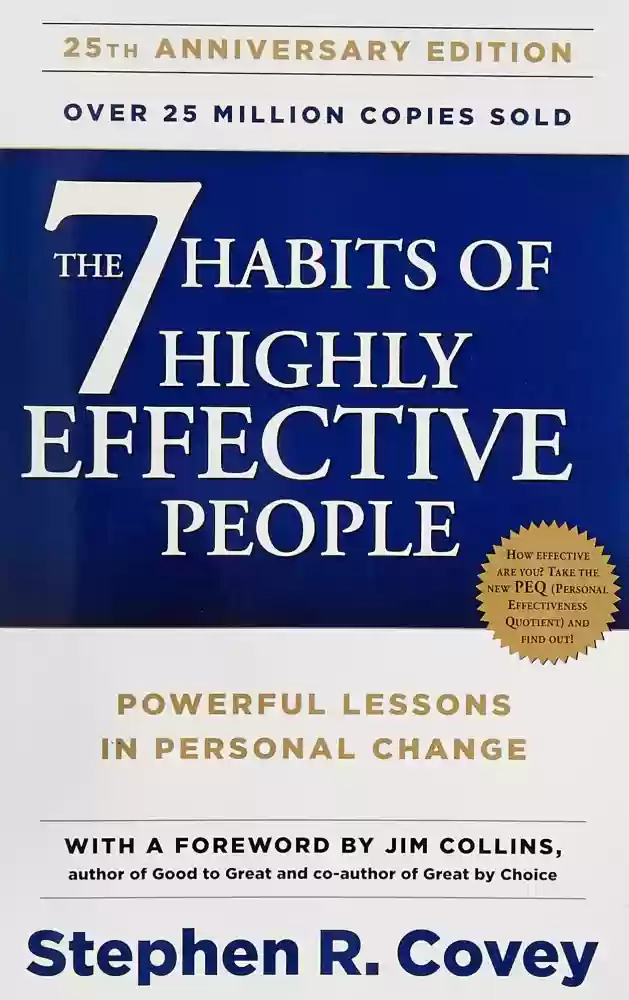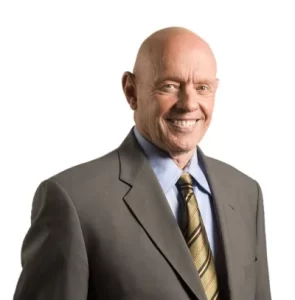Dive into the transformative principles of Stephen Covey’s ‘7 Habits of Highly Effective People,’ a self-help classic that has inspired millions. Covey’s insightful guide, encompassing leadership skills, time management, and effective communication, is a beacon for personal development enthusiasts. Learn to cultivate proactive habits, navigate time quadrants, and master the art of habit formation for sustained success in both personal and professional spheres
Discover Covey’s timeless wisdom in prioritization, goal setting, and the power of synergizing for collaborative excellence. With an emphasis on interdependence and a commitment to continuous improvement through ‘Sharpening the Saw,’ the 7 Habits framework empowers individuals to achieve a win-win mindset and embrace paradigm shifts in their approach to life.
Unleash your potential with Covey’s paradigm-shifting insights, whether you’re seeking empathic communication skills, strategic goal setting, or a holistic approach to personal effectiveness. Elevate your habits, transform your mindset, and embark on a journey of habitual excellence guided by the principles that define ‘7 Habits of Highly Effective People.
Elevate Your Game: Unpacking Stephen Covey’s ‘7 Habits’ for Maximum Impact
Introduction:
In the realm of personal development, Stephen Covey’s “The 7 Habits of Highly Effective People” stands as a beacon of wisdom, offering timeless principles for success and effectiveness. First published in 1989, Covey’s insights continue to guide individuals on a transformative journey toward personal and professional excellence. Let’s delve into the key takeaways that make this book a cornerstone for those seeking to enhance their effectiveness and achieve lasting success.
7 Habits of Highly Effective People:
1. Be Proactive:
Covey’s first habit encourages readers to take control of their lives by being proactive. Embrace responsibility, make conscious choices, and understand the power of your responses to external stimuli. By taking initiative and being proactive, individuals shape their destinies and influence positive change.
2. Begin with the End in Mind:
Habit two emphasizes the importance of envisioning your goals and desired outcomes before taking action. Start with a clear understanding of your destination, allowing you to align your actions with your values and create a roadmap for success. This habit fosters a proactive and purpose-driven approach to life.
3. Put First Things First:
Covey’s third habit focuses on effective time management. Prioritize tasks based on importance rather than urgency, distinguishing between what is truly significant and what is merely demanding attention. By focusing on “Quadrant II” activities, individuals can achieve long-term goals and maintain a healthy work-life balance.
4. Think Win-Win:
Habit four encourages a mindset of mutual benefit and collaboration. Covey emphasizes seeking solutions that are advantageous for all parties involved. By fostering a win-win mentality, individuals cultivate positive relationships, enhance teamwork, and create sustainable success in both personal and professional realms.
5. Seek First to Understand, Then to Be Understood:
Habit five underscores the importance of empathetic communication. Cultivate the habit of active listening and strive to understand others before expressing your own thoughts. By fostering genuine understanding, individuals build trust, improve relationships, and contribute to a more harmonious and effective environment.
6. Synergize:
Covey introduces the concept of synergy in the sixth habit, promoting the idea that the whole is greater than the sum of its parts. By leveraging collective strengths and perspectives, individuals can achieve innovative and powerful outcomes.
7. Sharpen the Saw:
The final habit revolves around self-renewal. Covey advocates for regular self-care and continuous improvement in physical, mental, emotional, and spiritual dimensions to sustain long-term effectiveness.
Conclusion:
As we conclude our exploration of “The 7 Habits of Highly Effective People,” it’s evident that Stephen Covey’s principles provide a transformative roadmap for personal and professional success. By internalizing these habits—being proactive, envisioning goals, prioritizing effectively, fostering collaboration, and practicing empathetic communication—one can unlock a path to sustained effectiveness and fulfillment. Embrace these habits, make them a part of your daily routine, and witness the positive impact they can have on your journey toward becoming a highly effective individual.
7 Real-life benefits from the Jist of “The 7 Habits of Highly Effective People” by Stephen Covey
“The 7 Habits of Highly Effective People” by Stephen Covey is a transformative self-help book that emphasizes principles for personal and professional effectiveness. Here are seven real-life benefits derived from the core concepts of the book:
1. Proactive Mindset:
Covey’s first habit, “Be Proactive,” encourages individuals to take control of their lives by being responsible for their choices and actions. This mindset shift empowers individuals to approach challenges with a proactive rather than a reactive attitude, fostering a sense of control and agency.
2. Clarity of Purpose and Goals:
The second habit, “Begin with the End in Mind,” emphasizes the importance of setting clear goals and defining a personal mission. This habit helps individuals align their actions with their long-term vision, leading to a more purposeful and fulfilling life.
3. Effective Time Management:
Covey’s third habit, “Put First Things First,” focuses on prioritizing tasks based on importance rather than urgency. This habit promotes effective time management, ensuring that individuals allocate their time to activities that align with their values and goals.
4. Empathetic Communication:
The fifth habit, “Seek First to Understand, Then to Be Understood,” underscores the importance of empathetic listening. By understanding others’ perspectives before expressing one’s own, individuals can build stronger, more collaborative relationships in both personal and professional settings.
5. Collaborative Synergy:
The sixth habit, “Synergize,” encourages the creation of collaborative solutions that are more powerful and effective than individual efforts. This habit promotes teamwork, innovation, and the combining of diverse strengths to achieve common goals.
6. Continuous Improvement:
The seventh habit, “Sharpen the Saw,” highlights the need for ongoing personal and professional development. By taking care of physical, mental, emotional, and spiritual well-being, individuals can sustain high levels of performance and achieve long-term success.
7. Balanced, Holistic Approach:
The overarching theme of the seven habits is a holistic approach to personal effectiveness. By integrating these habits into daily life, individuals can experience balance, improved relationships, and a more comprehensive and meaningful approach to success.
Frequently asked questions:
2: How can I apply Covey’s habits to my daily life for personal development?
Explore practical tips on applying Covey’s habits to enhance personal effectiveness, time management, and goal setting.
3: Are the principles in “The 7 habits of highly effective people” relevant for professional success?
Yes, Covey’s habits are widely applicable to professional settings, aiding in leadership development, teamwork, and effective communication.
4: Can the 7 habits be customized for different industries and career paths?
Absolutely. Covey’s principles are adaptable, offering universal guidance suitable for various industries and professions.
5: How long does it take to see results by implementing Covey’s habits?
Results vary, but consistency in applying the habits often leads to noticeable improvements in personal and professional life over time.
6: Can Covey’s principles help with stress management and work-life balance?
Covey’s principles, especially ‘Seek First to Understand, Then to Be Understood’ and ‘Think Win-Win,’ are powerful tools for enhancing relationships.
9: Can the book be beneficial for students or young professionals?

Who is Stephen Covey?
 Stephen R. Covey (1932–2012) was an American educator, author, businessman, and keynote speaker, best known for his influential self-help book “The 7 Habits of Highly Effective People.” Here is a brief biography of Stephen Covey:
Stephen R. Covey (1932–2012) was an American educator, author, businessman, and keynote speaker, best known for his influential self-help book “The 7 Habits of Highly Effective People.” Here is a brief biography of Stephen Covey:
Early Life and Education:
Stephen Richards Covey was born on October 24, 1932, in Salt Lake City, Utah. He earned a Bachelor of Science degree in Business Administration from the University of Utah, an MBA from Harvard University, and a Doctor of Religious Education (DRE) from Brigham Young University.
Academic Career:
Covey began his academic career as an assistant professor at the Marriott School of Management at Brigham Young University. He later became a professor of organizational behavior and business management. Covey’s academic work focused on leadership, time management, and effectiveness.
Leadership and Consulting:
In addition to his academic pursuits, Covey was a highly sought-after consultant and speaker. He co-founded the Covey Leadership Center, which later merged with Franklin Quest to become FranklinCovey. The organization specialized in leadership development and personal effectiveness training.
“The 7 Habits of Highly Effective People”:
Covey’s most impactful work came with the publication of “The 7 Habits of Highly Effective People” in 1989. The book, based on principles of effectiveness, personal development, and ethics, became a bestseller and is widely considered one of the most influential self-help books of all time. The seven habits outlined in the book are foundational principles for personal and professional effectiveness.
Other Works:
Covey authored several other books, including “First Things First,” “Principle-Centered Leadership,” and “The 8th Habit: From Effectiveness to Greatness.” Each work continued to explore themes of leadership, effectiveness, and personal development.
Legacy:
Stephen Covey’s teachings and principles have left a lasting impact on the fields of personal and professional development. His concept of the “Character Ethic” versus the “Personality Ethic” and the seven habits continue to be influential across various industries and disciplines.
Passing:
Stephen Covey passed away on July 16, 2012, at the age of 79, due to complications from injuries sustained in a bicycle accident. Despite his physical absence, Covey’s legacy endures through his writings, teachings, and the ongoing impact of his principles on individuals and organizations worldwide.
Frequently asked questions about Stephen Covey:
1. Who is Stephen Covey?
Stephen R. Covey (1932–2012) was an American educator, author, and motivational speaker, best known for his influential self-help book “The 7 Habits of Highly Effective People.” Covey’s teachings focused on personal and professional effectiveness, leadership, and ethical decision-making.
2. How did Stephen Covey die?
Stephen Covey passed away on July 16, 2012, due to complications from injuries sustained in a bicycle accident. He was 79 years old at the time of his death.
3. Is Britain Covey related to Stephen Covey?
Britain Covey an American football wide receiver and return specialist is the grandson of Stephen Covey.
4. Is FranklinCovey related to Stephen Covey?
Yes, FranklinCovey is related to Stephen Covey. FranklinCovey is a global company formed through the merger of Franklin Quest and the Covey Leadership Center in 1997. The merger brought together the organizational expertise of Franklin Quest and the leadership principles of Stephen Covey, making FranklinCovey a prominent name in personal and professional development.
5. Did Stephen Covey die?
Yes, Stephen Covey passed away on July 16, 2012, at the age of 79.
Popular quotes by Stephen Covey
Stephen Covey, the author of “The 7 Habits of Highly Effective People,” is known for his impactful and insightful quotes. Here are some popular quotes attributed to Stephen Covey:
“The key is not to prioritize what’s on your schedule, but to schedule your priorities.”
“You can’t talk your way out of problems you behaved your way into.”
“Most people do not listen with the intent to understand; they listen with the intent to reply.”
“Begin with the end in mind.”
“The way we see the problem is the problem.”
“Seek first to understand, then to be understood.”
“Strength lies in differences, not in similarities.”
“Live out of your imagination, not your history.”
“The best way to predict the future is to create it.”
“Every human has four endowments – self-awareness, conscience, independent will, and creative imagination. These give us the ultimate human freedom… The power to choose, to respond, to change.”
These quotes reflect Covey’s emphasis on personal responsibility, effective communication, and the importance of aligning actions with a clear sense of purpose and principles.
No Comments on “The 7 Habits of Highly Effective People” by Stephen Covey